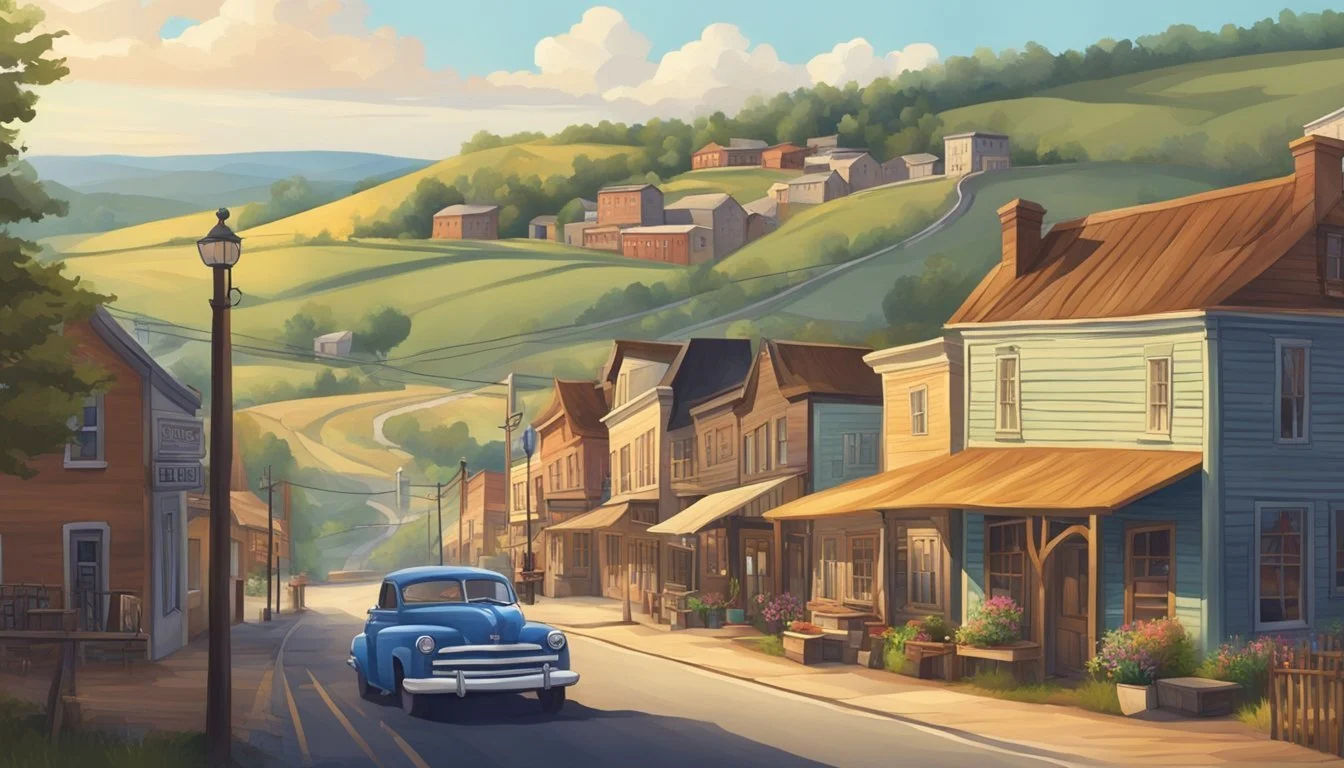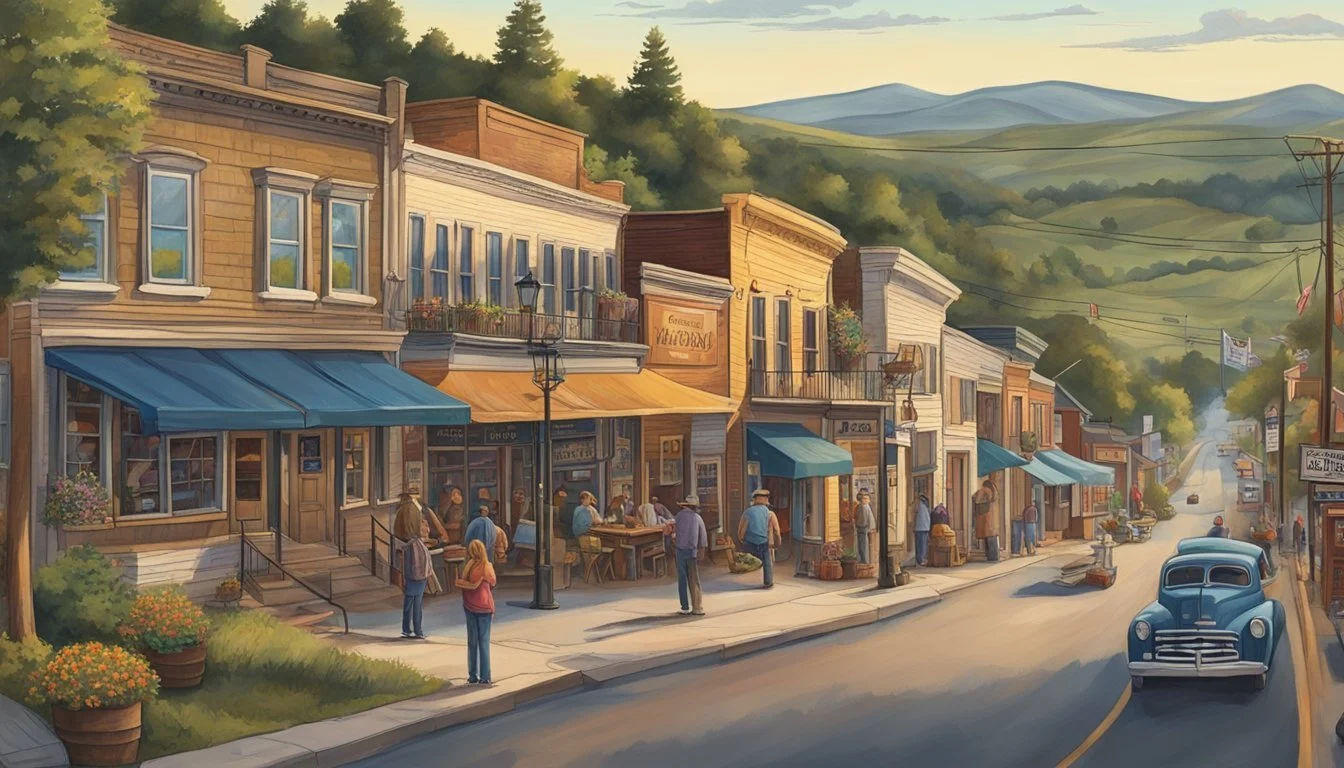Willie Nelson's Hometown: The Tiny Texas Town That Shaped a Legend!
Willie Nelson's roots run deep in the small town of Abbott, Texas. Born there on April 29, 1933, Nelson spent his formative years in this tight-knit community of fewer than 400 residents. Abbott played a crucial role in shaping Nelson's musical journey, serving as the backdrop for his earliest performances and songwriting efforts.
Nelson's connection to Abbott remained strong throughout his life. He learned to play guitar from his grandfather and began performing at local dances by age 10. The Abbott United Methodist Church, where Nelson and his family were parishioners, held special significance for the budding musician. In 2006, when the church faced financial difficulties, Nelson stepped in to help preserve this piece of his hometown's history.
Today, Abbott continues to honor its most famous son. Visitors can explore Nelson's childhood home and other local landmarks that influenced his music and character. While Nelson's career took him far beyond the borders of Abbott, the town's impact on his life and art remains evident in his songs and his enduring affection for his Texas roots.
Early Life in Abbott, Texas
Willie Nelson was born on April 29, 1933, in Abbott, Texas. This small town, located 70 miles south of Dallas and 30 miles north of Waco, would shape his early years and musical influences.
Abbott began as a railroad town in the 1880s during the construction of the Missouri-Kansas-Texas Railroad. Cotton was a major crop in the area, and young Willie would later work in the cotton fields.
Nelson's parents divorced when he was only six months old. He and his older sister Bobbie were raised by their paternal grandparents, who encouraged their musical interests.
The Abbott Methodist Church played a significant role in Willie's childhood. He and Bobbie attended services there regularly, where they were exposed to gospel music that would influence their future careers.
Growing up during the Great Depression, Willie experienced the economic hardships that affected many families in rural Texas. These experiences would later inspire some of his songwriting.
Willie wrote his first song at the age of seven, demonstrating his early talent for music. His sister Bobbie focused on playing the piano, while Willie chose the guitar as his instrument.
Despite facing challenges, Willie's upbringing in Abbott provided him with a strong sense of community and musical foundation that would shape his future as a country music icon.
Musical Beginnings and Influences
Willie Nelson's musical journey began in his small Texas hometown, shaped by diverse genres and artists. His early exposure to various styles laid the foundation for his unique sound and approach to songwriting.
The Formative Years
Willie Nelson started playing guitar at age six, taught by his grandfather. By ten, he was performing at local dances and events in Abbott, Texas. The town's musical landscape, rich with country, gospel, and blues, deeply influenced his developing style.
Nelson's first band experiences came in high school, where he played in the Bohemian Polka Band. This early exposure to different rhythms and melodies expanded his musical repertoire.
Influential Genres and Artists
Country music icons like Hank Williams and Bob Wills significantly impacted Nelson's musical direction. Western swing, popularized by Wills, became a key element in Nelson's sound.
Jazz guitarist Django Reinhardt's innovative playing style captivated Nelson, inspiring his own unique guitar technique. The blend of country, jazz, and pop in Nelson's music reflects these diverse influences.
Gospel music, heard in local churches, also played a crucial role in shaping Nelson's vocal style and songwriting approach. This mix of genres contributed to his distinctive sound that would later define outlaw country.
Rise to Fame
Willie Nelson's journey to stardom began with his exceptional songwriting talents and unique vocal style. His ascent in the country music world was marked by hit compositions and groundbreaking albums.
Initial Songwriting Success
Nelson moved to Nashville in 1960 to pursue a music career. He quickly gained recognition as a talented songwriter. His composition "Night Life" became a hit for Ray Price in 1963. Nelson penned "Crazy" for Patsy Cline, which turned into one of her signature songs.
"Hello Walls" became a massive success for Faron Young in 1961. Nelson's songwriting prowess earned him respect in the industry. He signed with Liberty Records but struggled to find success as a performer initially.
Breakthrough Albums
In the early 1970s, Nelson embraced the emerging Outlaw Country movement. He signed with Atlantic Records and released "Shotgun Willie" in 1973. The album showcased his distinctive style and marked a turning point in his career.
"Red Headed Stranger" in 1975 became Nelson's first major commercial success as a performer. The concept album's stripped-down sound resonated with audiences. It included his first #1 hit as a singer, "Blue Eyes Crying in the Rain."
Nelson's 1978 album "Stardust" further expanded his fanbase. The collection of pop standards demonstrated his versatility and crossover appeal. It remained on the country charts for a decade, cementing Nelson's status as a music legend.
Establishing a Music Career
Willie Nelson's journey to stardom was marked by persistence and innovation. He carved out a unique place in country music through his distinctive style and willingness to challenge conventions.
The Outlaw Movement
Willie Nelson played a pivotal role in the Outlaw Movement of country music in the 1970s. His album "Shotgun Willie" (1973) marked a turning point, breaking away from the polished Nashville sound. This record showcased Nelson's raw, authentic style and unconventional approach to songwriting.
The movement gained momentum with like-minded artists such as Waylon Jennings and Kris Kristofferson. Together, they pushed boundaries and redefined country music norms. Nelson's rebellious spirit and refusal to conform to industry standards set him apart as a true musical maverick.
Crossover Appeal and Stardom
Nelson's crossover success came with his rendition of "Blue Eyes Crying in the Rain" in 1975. The song topped country charts and reached the pop Top 40, earning him his first Grammy Award. This breakthrough expanded his audience beyond traditional country fans.
His 1978 album "Stardust" further cemented his mainstream appeal. It remained on the country charts for a decade, showcasing Nelson's versatility as an interpreter of pop standards. The 1982 hit "Always on My Mind" became one of his signature songs, winning three Grammy Awards.
Nelson's distinctive voice, poetic lyrics, and guitar playing style attracted fans across genres. His collaborations with artists from various musical backgrounds helped solidify his status as a cultural icon beyond country music.
Activism and Advocacy
Willie Nelson has leveraged his fame and musical talents to support various causes throughout his career. His activism focuses on helping farmers and advocating for marijuana legalization.
Farm Aid and Benefit Concerts
Farm Aid, co-founded by Willie Nelson in 1985, stands as his most prominent charitable endeavor. The annual benefit concert raises funds and awareness for family farmers across America.
Nelson has organized and performed at numerous Farm Aid events over the decades. These concerts have featured many high-profile musicians and raised millions of dollars for farming communities.
Beyond Farm Aid, Nelson frequently participates in other benefit concerts. He has lent his voice to causes like disaster relief, environmental protection, and animal welfare.
Marijuana Legalization Efforts
Willie Nelson is a vocal advocate for marijuana legalization. He serves on the advisory board of the National Organization for the Reform of Marijuana Laws (NORML).
Nelson has spoken publicly about his personal cannabis use and its benefits. He argues for decriminalization and emphasizes the plant's medicinal properties.
In 2015, Nelson launched Willie's Reserve, his own brand of cannabis products. The company aims to support small, independent growers and promote sustainable farming practices.
Through Willie's Reserve, Nelson continues to push for policy changes around marijuana. He uses his platform to educate the public and challenge longstanding prohibitions.
Later Career and Legacy
Willie Nelson's later career saw continued musical success and widespread recognition for his contributions to country music. He released acclaimed albums and received numerous prestigious honors.
Continued Success in Music
In his later years, Willie Nelson remained prolific. He released the album "Heroes" in 2012, featuring collaborations with various artists. "Last Man Standing" followed in 2018, showcasing Nelson's enduring songwriting skills.
"Ride Me Back Home" arrived in 2019, earning Nelson a Grammy Award for Best Country Solo Performance. The album's title track addressed animal welfare, a cause close to Nelson's heart.
Nelson also revisited earlier material. The "IRS Tapes" were reissued, stemming from recordings made to pay off tax debts in the 1990s.
Honors and Recognition
Willie Nelson's impact on music earned him numerous accolades. He was inducted into the Country Music Hall of Fame in 1993, recognizing his transformative influence on the genre.
In 1998, Nelson received Kennedy Center Honors for his lifetime contributions to American culture. He joined the Rock and Roll Hall of Fame in 2015, acknowledging his cross-genre appeal.
Nelson's Grammy Awards span decades. He won Best Country Vocal Performance, Male in 1979 for "Georgia on My Mind" and Best Traditional Pop Vocal Album in 2016 for "Summertime: Willie Nelson Sings Gershwin."
Personal Life and Family
Willie Nelson has been married four times and has seven children. His first marriage was to Martha Matthews from 1952 to 1962.
Nelson's family has played a significant role in his music career. He formed the Willie Nelson Family Band, which includes his sister Bobbie Nelson on piano.
The Family Bible holds special meaning for Nelson. He wrote the song "Family Bible" based on memories of his grandmother reading from it during his childhood in Abbott, Texas.
Nelson briefly attended Baylor University in Waco, Texas, but dropped out to pursue his music career. He later received an honorary doctorate from the university in 2015.
His children have followed in his musical footsteps. Sons Lukas and Micah Nelson are both accomplished musicians, often performing with their father.
Nelson's commitment to family extends beyond blood relations. He has created a tight-knit community of musicians, friends, and fans that he considers part of his extended family.
The Nelson Brand
Willie Nelson's influence extends far beyond music into business and cultural spheres. His iconic image and values have shaped a powerful brand with wide-reaching impact.
Business Ventures
Willie Nelson's entrepreneurial spirit led to several successful business ventures. Willie's Reserve, launched in 2015, offers a line of cannabis products reflecting Nelson's long-standing advocacy for marijuana legalization. The brand emphasizes sustainability and small-farm sourcing.
Willie's Stash, a series of archival releases, showcases rare and previously unreleased recordings from Nelson's vast catalog. These collections give fans access to hidden gems from his storied career.
Nelson's foray into biodiesel with Willie Nelson Biodiesel in 2005 demonstrated his commitment to alternative energy sources. Though short-lived, it highlighted his environmental concerns.
Cultural Impact
Nelson's brand transcends music, embodying American values of independence and authenticity. His albums "God's Problem Child" and "My Way" reinforce his image as a wise, rebellious spirit.
His annual Farm Aid concerts, co-founded in 1985, have raised awareness and funds for family farmers for decades. This initiative solidified Nelson's role as an advocate for rural America.
Nelson's distinctive look - braids, bandana, and beat-up guitar - has become instantly recognizable. This visual brand appears on merchandise, album covers, and in pop culture references.
His outlaw image and support for progressive causes have made him a unique cultural icon, bridging generational and political divides.
Discography and Artistry
Willie Nelson's musical career spans over six decades, marked by prolific album releases and a distinctive songwriting style. His discography reflects his evolution as an artist and his impact on country music.
Iconic Albums and Singles
Nelson's discography includes over 100 studio albums. "Shotgun Willie" (1973) marked a turning point in his career, embracing a more progressive country sound. "Red Headed Stranger" (1975) became a critical and commercial success, cementing Nelson's outlaw country image.
"Stardust" (1978) showcased his versatility with pop standards. "Always on My Mind" (1982) produced the hit title track, winning multiple Grammy Awards.
Notable singles include "On the Road Again," "Blue Eyes Crying in the Rain," and "Georgia on My Mind." These songs demonstrate Nelson's ability to craft memorable melodies and deliver emotive performances.
Songwriting Style
Nelson's songwriting is characterized by its simplicity, honesty, and storytelling. He often draws from personal experiences and universal themes of love, loss, and life on the road.
His lyrics frequently employ vivid imagery and metaphors. Nelson's songs often feature unconventional structures and phrasings, reflecting his unique vocal style.
"Crazy," written for Patsy Cline, exemplifies his ability to capture complex emotions in straightforward language. "Phases and Phases" (1974) demonstrated his skill at crafting concept albums, telling a cohesive story through interconnected songs.
Nelson's songwriting has earned him recognition from the Songwriters Hall of Fame and the Nashville Songwriters Hall of Fame.
Collaborations and Group Projects
Willie Nelson's career is marked by numerous collaborations that have enriched country music and beyond. His work with The Highwaymen, a supergroup formed in 1985, stands out as particularly influential.
The Highwaymen consisted of Nelson, Johnny Cash, Waylon Jennings, and Kris Kristofferson. They released three albums and toured extensively, bringing outlaw country to a wider audience.
Nelson's collaborative spirit extends to charitable causes. He participated in the 1985 recording of "We Are the World," joining a star-studded lineup to raise funds for African famine relief.
His annual Fourth of July Picnics, started in 1973, became a platform for musical collaborations. These events, often held in Texas, featured diverse lineups of country, rock, and folk artists.
Nelson's work spans both Austin and Nashville, bridging two pivotal centers of country music. In Austin, he helped shape the "outlaw country" movement, while his Nashville connections facilitated collaborations with mainstream country artists.
Recent years have seen Nelson continue to collaborate across genres and generations. He has recorded duets with artists ranging from Snoop Dogg to Norah Jones, demonstrating his enduring relevance and versatility in the music industry.
The Influence of Historical Events
Willie Nelson's hometown of Abbott, Texas was shaped by major historical events of the 20th century. The Great Depression left a lasting impact on the small farming community during Nelson's childhood in the 1930s.
Economic hardship forced many families to adapt and persevere, instilling values of resilience that would later influence Nelson's music and outlook. The town's struggles during this period likely contributed to themes of hardship and endurance in his songwriting.
The Korean War also touched Abbott in the early 1950s. Nelson himself joined the Air Force in 1950, serving for about nine months before being medically discharged. This brief military experience exposed him to a wider world beyond rural Texas.
Nelson's time in the Air Force, though short, introduced him to diverse musical influences from fellow servicemen. This exposure likely broadened his musical horizons and contributed to his eventual genre-blending style.
The post-war economic boom brought changes to small towns like Abbott. As farming practices modernized, the traditional rural lifestyle Nelson knew began to shift. These changes may have fueled his later nostalgic depictions of small-town life in his music.
Nelson's Contributions to Culture
Willie Nelson's impact extends far beyond music into film, television, and iconic cultural events. His distinctive presence has shaped American entertainment and celebrations for decades.
Film and Television
Willie Nelson made his acting debut in the 1979 film "The Electric Horseman" alongside Robert Redford. He went on to appear in over 30 films, including "Honeysuckle Rose" and "Wag the Dog." Nelson's rugged charm and natural charisma translated well to the screen.
On television, he guest-starred on popular shows like "Miami Vice" and "Dr. Quinn, Medicine Woman." Nelson also appeared in numerous commercials, further cementing his status as a cultural icon.
His autobiography, "Willie: An Autobiography," was adapted into the TV movie "Willie Nelson: The Big Six-0" in 1993.
Performances and Celebrations
Nelson's annual Fourth of July Picnic, first held in 1973, became a Texas tradition. The event showcased country music's biggest stars and up-and-coming acts.
In 1975, Nelson performed at Austin's Armadillo World Headquarters, helping popularize the "outlaw country" movement. This performance solidified Austin's reputation as a music hub.
Nelson's Farm Aid concerts, started in 1985, raised awareness and funds for struggling family farms. These events featured collaborations with diverse artists, bridging musical genres.
His New Year's Eve concerts at Austin's ACL Live became highly anticipated annual celebrations, drawing fans from across the country.














